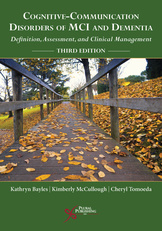Publication
Cognitive-Communication Disorders of MCI and Dementia
Definition, Assessment, and Clinical Management
Former Title: Cognitive-Communication Disorders of Dementia: Definition, Diagnosis, and Treatment
- Third Edition
- Details:
- 265 pages, Illustrated (B/W), Softcover, 7 x 10"
- ISBN13:
- 978-1-63550-060-8
- Release Date:
- 12/10/2018
Overview
A Must-Have Resource for Clinicians, Instructors, and Students in Training!
Written by internationally recognized experts, Cognitive Communication Disorders of MCI and Dementia, Third Edition provides professionals and students the most up-to-date research on the clinical assessment and management of individuals with dementia and those with mild cognitive impairment (MCI), the fastest growing clinical population. Dr. Kimberly McCullough, an expert on MCI and cognitive stimulation, joined Bayles and Tomoeda as co-author and this edition has an increased coverage of MCI, its characteristic features, the diagnostic criteria for its diagnosis, and treatment options.
Students and practicing professionals will appreciate the authors' overview of the relation of cognition to communicative function and the characterization of how both are affected in MCI and the common dementia-related diseases including Alzheimer's, Lewy Body, Vascular, Parkinson's, Huntington's, Frontotemporal and Down Syndrome. A summary of important points at the end of chapters highlights essential clinical information and guides student learning. An all-new Clinical Guide comprises the second half of the book providing an extensive discussion of the process of assessment and evidence-based treatments for individuals in all stages of dementia.
Features of the New Clinical Practice Guide
Assessment: The authors provide a step-by-step discussion of the assessment process, an overview of reputable tests, and how to differentiate cognitive-communication disorders associated with MCI and dementing diseases.
Treatment: This section includes comprehensive and detailed instructions for implementing evidence-based interventions for individuals in all stages of dementia. Additional topics include:
- A person-centered model for successful intervention
- Cognitive stimulation programming for MCI
- Clinical techniques supported by the principles of neuroplasticity
- Indirect interventions that facilitate communication, quality of life, and the safety of individuals with dementia
- Caregiver counseling
- Care planning, goal setting, reimbursement and required documentation
Case Examples: Includes restorative and functional maintenance plans.
Cognitive-Communication Disorders of MCI and Dementia: Definition, Assessment, and Clinical Management was written by individuals dedicated to the study and treatment of cognitive-communicative disorders associated with dementia. Their research has received support by the NIH, the Alzheimer's and Related Disorders Association, the Andrus Foundation, as well as the University of Arizona, Appalachian State University and the University of Central Arkansas.
Preface
Acknowledgements
Chapter 1. Speech-Language Pathology, Mild Cognitive Impairment, and Dementia
Chapter 2. Cognition, Memory, and Communication
Chapter 3. MCI: Mild Cognitive Impairment
Chapter 4. Alzheimer's Dementia
Chapter 5. Dementia and Down Syndrome
Chapter 6. Vascular Dementia
Chapter 7. Parkinson's Disease and Dementia
Chapter 8. Dementia and Lewy Body Disease
Chapter 9. Dementia and Huntington's Disease
Chapter 10. Frontotemporal Dementia
Clinical Guide: Assessments and Interventions for Cognitive-Communication Disorders of Dementia
Section I. Assessment
Section II. Cognitive Intervention
Section III. Treatment: Direct Interventions for Individuals with MCI and Dementia
Section IV. Indirect Interventions for Individuals with Dementia
Section V. Reimbursement and Care Planning for Persons with Dementia
References for Clinical Guide
Index
About The Authors
Kathryn Bayles is an internationally known expert on the cognitive-communicative disorders of dementia. Now Professor-Emerita at the University of Arizona, Dr. Bayles has served as Department Head of Speech, Language and Hearing Sciences and Associate Director for the National Center for Neurogenic Communication Disorders. Her research has received support from the National Institutes on Aging, Mental Health, Deafness and Other Communication Disorders, the Alzheimers Association and the Robert Wood Johnson and Andrus Foundations. She is a Fellow in the American Speech-Language-Hearing Association and Honors recipient and a Past President of the Academy of Neurologic Communication Disorders and Sciences.
Kim McCullough PhD, CCC-SLP is a Professor and Graduate Program Director at Appalachian State University. Dr. McCullough is a certified speech-language pathologist with clinical expertise in providing services to individuals with neurogenic communication disorders. Dr. McCulloughs clinical activities and research focus on aging, mild cognitive impairment, dementia, and interventions for sustaining brain function. At Appalachian State University, she teaches the following courses: Neuroscience of Communication, Adult Neurogenic Communication Disorders, and Motor Speech Disorders. Dr. McCullough serves as the BCHS IPE program director. In this role she is responsible for planning, coordinating, and implementing interprofessional education within the college. In addition to her classroom and clinic teaching responsibilities, Dr. McCullough often mentors student research projects and theses.
Ms. Tomoeda is Associate Director of Development for the University of Arizona College of Science after a 22-year career in the Department of Speech, Language, and Hearing Sciences. She is known for her work with Dr. Kathryn Bayles on the communication abilities of individuals with dementia. The two have collaborated on three other books, and co-authored two standardized tests for evaluating the cognitive-communication disorders of dementia, and conducted research on this topic for over 20 years.
Related Titles
Cognitive Rehabilitation Therapy for Traumatic Brain Injury
321 pages, Illustrated (B/W), Softcover, 7 x 10"
Deductive Reasoning Exercises for Attention and Executive Functions
194 pages, Illustrated (B/W), Softcover, 8.5 x 11"
The Right Hemisphere and Disorders of Cognition and Communication
301 pages, Illustrated (B/W), Softcover, 7 x 10"
Assessment of Communication Disorders in Adults
496 pages, Illustrated (B/W), Softcover, 8.5 x 11"
A Coursebook on Aphasia and Other Neurogenic Language Disorders
351 pages, Illustrated (B/W), Spiral Bound, 8.5 x 11"
Brain-Based Communication Disorders
Leonard L. LaPointe, Bruce E. Murdoch, Julie A. G. Stierwalt
265 pages, Color Illustrations (4 Color), Hardcover, 7 x 10"
Here's How to Treat Dementia
Jennifer L. Loehr, Megan L. Malone
200 pages, Illustrated (B/W), Softcover, 8.5 x 11"
Adult Audiologic Rehabilitation
Edited by: Joseph J. Montano, Jaclyn B. Spitzer
608 pages, Illustrated (B/W), Hardcover, 8.5 x 11"
MCI and Alzheimer's Dementia
Kathryn Bayles, Cheryl K. Tomoeda
232 pages, Color Illustrations (2 Color), Softcover, 6 x 9"


















